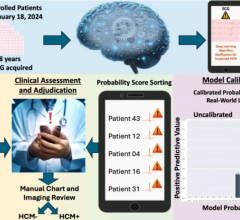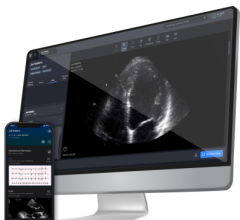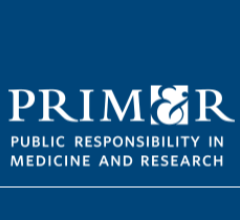
The U.S. Food and Drug Administration (FDA) has cleared AliveCor's Kardia AI V2 next generation of interpretive artificial intelligence (AI)-based personal electrocardiogram (ECG) algorithms.
November 24, 2020 — The U.S. Food and Drug Administration (FDA) has cleared AliveCor's next generation of interpretive artificial intelligence (AI)-based personal electrocardiogram (ECG) algorithms.
"Kardia AI V2 is the most sophisticated AI ever brought to personal ECG," said AliveCor CEO Priya Abani. "This suite of algorithms and visualizations will provide the platform for delivery of new consumer and professional service offerings beyond AFib, by allowing a much wider range of cardiac conditions to be determined on a personal ECG device."
AliveCor's KardiaMobile and KardiaMobile 6L devices, along with the Kardia app, allow users to take a 30-second ECG and receive instant determinations of multiple cardiac conditions. This new FDA 510(K) clearance provides detail and fidelity unlike any previously seen in personal ECG devices including:
• A "Sinus Rhythm with Premature Ventricular Contractions (PVCs)" determination if two or more ventricular ectopic beats are detected. PVCs are a common occurrence where extra heartbeats originate in the bottom chamber of the heart and occur sooner than the next expected regular heartbeat. After the PVC beat, a pause usually occurs, which causes the next normal heartbeat to be more forceful. When one feels the heart "skip a beat," it is this more forceful beat that is felt.
• A "Sinus Rhythm with Supraventricular Ectopy (SVE)" determination if narrow-complex ectopy, such as premature atrial contractions (PACs), are detected. PACs are similar to PVCs, but these beats originate in the top chamber of the heart, however not in the heart's natural pacemaker, the Sinus Node.
• A "Sinus Rhythm with Wide QRS," determination for QRS intervals of 120ms or longer. Wide QRS indicates that the activation of the bottom chamber of the heart is taking longer than expected. This could indicate a bundle branch block in which there is a delay in the passage of heart's electrical signals along the bottom of the heart.
• A reduced number of "Unclassified" readings, thereby giving users more reliable insight into their heart rhythms.
• Improved sensitivity and specificity on the company's "Normal" and "Atrial Fibrillation" algorithms, giving users fewer false positives, fewer false negatives, and even greater confidence in Kardia determinations.
• New visualizations, including average beat, PVC identification, and a tachogram.
AliveCor expects this new suite of advanced determinations will augment telehealth services and provide the technology foundation for a new range of professional and consumer services including the launch of:
• Advanced ECG determination services within KardiaCare, the company's remote heart care service for consumers.
• The Kardia Heart Health Report (HHR), a cardiologist-backed patient heart risk assessment report.
• A professional ambulatory monitoring service, using the AliveCor six-lead ECG device at home, bringing greater comfort and convenience over legacy technologies.
• Chronic heart disease management, which combines human-backed and digital care plans to manage the heart health of high-risk employee populations.
This new FDA clearance positions AliveCor to deliver AI-based remote cardiological services for the vast majority of cases when cardiac patients are not in front of their doctor. AliveCor's goal is to help cardiologists efficiently provide the best possible 24/7 service to their patients.
Today, KardiaMobile and KardiaMobile 6L are the most clinically validated personal ECG devices in the world, and provide instant detection of Normal Sinus Rhythm, Atrial Fibrillation, Bradycardia, and Tachycardia. The new determinations and services will be available in 2021.
For more information: alivecor.com
Related Artificial intelligence Application in Echo and Cardiology:
New Cardiac Diagnostic Tool Helps Automate Point-of-Care Ultrasound Screening
JAMA Cardiology Article Shows Effectiveness of AI-Guided Ultrasound Software
Mayo Clinic Uses Artificial Intelligence to Help Assess Cardiac Danger From COVID-19
Northwestern Medicine Introduces Artificial Intelligence to Improve Ultrasound Imaging
FDA Clears Ultromics Echocardiography AI for Automated Identification of Coronary Artery Disease
TomTec Releases New Echocardiography Technologies With AI and Auto Quantification
VIDEO: AI-Assisted Automatic Ejection Fraction for Point-of-Care Ultrasound
New Cardiac Diagnostic Tool Helps Automate Point-of-Care Ultrasound Screening
FDA Clears Caption Health AI-assisted Point-of-care Ejection Fraction Evaluation
WEBINAR: Intelligently Efficient Adult Echo Structured Reporting
What is New in Cardiology? A Review of All Major Emerging Technologies for Heart Diseases
Expanded AI-based Echocardiography Analysis and Reporting Added to Konica Minolta Exa Cardio PACS
More Than 50,000 Children Screened for Congenital Heart Defects Using AI-enabled Stethoscopes


 September 24, 2025
September 24, 2025 









